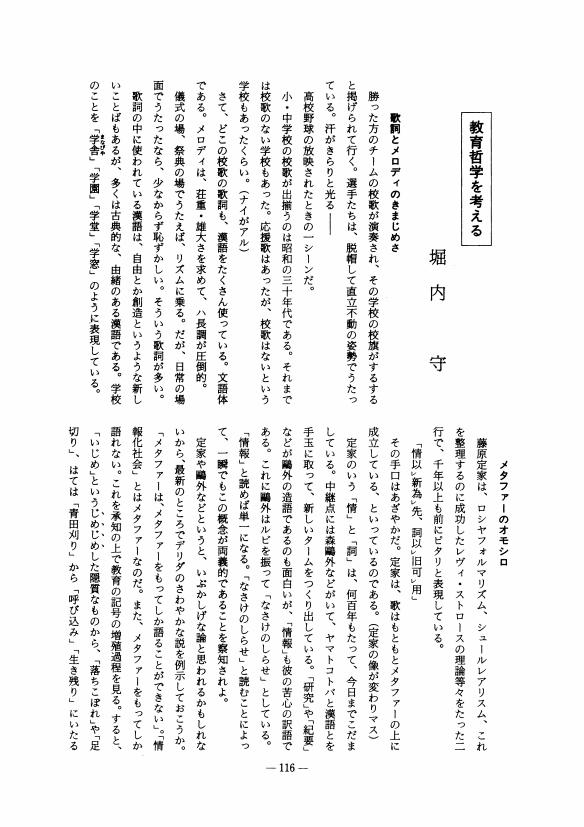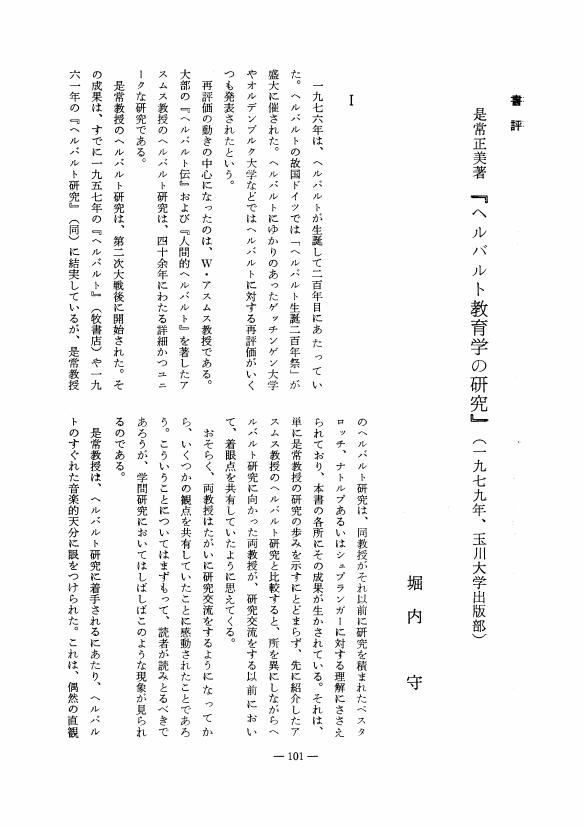1 0 0 0 OA 討論経過のまとめ
- 著者
- 堀内 守
- 出版者
- 教育哲学会
- 雑誌
- 教育哲学研究 (ISSN:03873153)
- 巻号頁・発行日
- vol.1990, no.61, pp.17-20, 1990-05-10 (Released:2009-09-04)
1 0 0 0 OA 教育哲学を考える
- 著者
- 堀内 守
- 出版者
- 教育哲学会
- 雑誌
- 教育哲学研究 (ISSN:03873153)
- 巻号頁・発行日
- vol.1989, no.59, pp.116-117, 1989-05-10 (Released:2009-09-04)
1 0 0 0 OA 市村尚久著『アメリカ六・三制の成立課程-教育思想の側面からの考察-』
- 著者
- 堀内 守
- 出版者
- 教育哲学会
- 雑誌
- 教育哲学研究 (ISSN:03873153)
- 巻号頁・発行日
- vol.1988, no.57, pp.88-91, 1988-05-10 (Released:2009-09-04)
1 0 0 0 OA 問われる世界認識 第五回世界比較教育学会に参加して
- 著者
- 堀尾 輝久
- 出版者
- 教育哲学会
- 雑誌
- 教育哲学研究 (ISSN:03873153)
- 巻号頁・発行日
- vol.1984, no.50, pp.84-89, 1984-11-10 (Released:2009-09-04)
- 参考文献数
- 7
1 0 0 0 OA 哲学的探求の教育実践における意義
- 著者
- 堀尾 輝久
- 出版者
- 教育哲学会
- 雑誌
- 教育哲学研究 (ISSN:03873153)
- 巻号頁・発行日
- vol.1983, no.47, pp.9-14, 1983-05-15 (Released:2009-09-04)
1 0 0 0 OA 哲学する条件
- 著者
- 堀内 守
- 出版者
- 教育哲学会
- 雑誌
- 教育哲学研究 (ISSN:03873153)
- 巻号頁・発行日
- vol.1983, no.47, pp.14-18, 1983-05-15 (Released:2009-09-04)
1 0 0 0 OA 是常正美著『ヘルバルト教育学の研究』 (一九七九年、玉川大学出版部)
- 著者
- 堀内 守
- 出版者
- 教育哲学会
- 雑誌
- 教育哲学研究 (ISSN:03873153)
- 巻号頁・発行日
- vol.1981, no.43, pp.101-104, 1981-05-10 (Released:2009-09-04)
1 0 0 0 OA 現代教育と青少年の問題行為 文明論風に
- 著者
- 堀内 守
- 出版者
- 教育哲学会
- 雑誌
- 教育哲学研究 (ISSN:03873153)
- 巻号頁・発行日
- vol.1979, no.39, pp.9-12, 1979 (Released:2009-09-04)
1 0 0 0 OA 教育思想における教育と政治
- 著者
- 堀内 守
- 出版者
- 教育哲学会
- 雑誌
- 教育哲学研究 (ISSN:03873153)
- 巻号頁・発行日
- vol.1977, no.35, pp.17-24, 1977-05-20 (Released:2009-09-04)
1 0 0 0 OA 〈神の三書〉性とコメニウス教育学の方法的発展
- 著者
- 堀内 守
- 出版者
- 教育哲学会
- 雑誌
- 教育哲学研究 (ISSN:03873153)
- 巻号頁・発行日
- vol.1963, no.8, pp.32-49, 1963-06-25 (Released:2010-05-07)
- 参考文献数
- 53
I have tried in this essay to follow the educational thought of Comenius in its formation and evolution. Through a study of his main writings I have endeavored to make clear the logical development of his thought, and through an analysis of the sketches of seventeenth century urban life and development of industrial techniques that appear throughout his writings I have tried to bring out the practical meaning of his educational theory.In his The Labyrinth of the World, a work of realistic criticism of the turmoil and destruction that accompanied the Thirty Years War, Comenius returned to the idea of creation and made it clear that man is capable of transforming the earth and establishing peace. This theme of harmony he carried over into his Didactica Magna, and education as the technique of forming man was systematized therein as an academic discipline. This theme was developed further in the Janua and Schola Ludus which included discussions on the development of industrial techniques and the corresponding new society. In the Panpaedia the theme developed further into an analysis of human desire. This was the system coordinating the tremendous mechanism of the Pansophia and the movement of knowledge, the system that envisaged the realization on earth of the “religion of paradise.”
1 0 0 0 OA アメリカ教育哲学の現状
- 著者
- 新堀 通也
- 出版者
- 教育哲学会
- 雑誌
- 教育哲学研究 (ISSN:03873153)
- 巻号頁・発行日
- vol.1960, no.2, pp.83-85, 1960-03-01 (Released:2009-09-04)
1 0 0 0 OA 〈シンポジウムのまとめ〉医療のグローバル化 臓器移植・生殖補助医療・臨床試験
- 著者
- 江口 聡 堀田 義太郎
- 出版者
- 日本医学哲学・倫理学会
- 雑誌
- 医学哲学 医学倫理 (ISSN:02896427)
- 巻号頁・発行日
- vol.32, pp.80-82, 2014 (Released:2018-02-01)
1 0 0 0 OA 生体間臓器提供の倫理問題 : 自発性への問い
- 著者
- 堀田 義太郎
- 出版者
- 日本医学哲学・倫理学会
- 雑誌
- 医学哲学 医学倫理 (ISSN:02896427)
- 巻号頁・発行日
- vol.24, pp.31-41, 2006-10-24 (Released:2018-02-01)
In this paper, I examine the condition of living organ donation. In the first part, I show that the principle of voluntary donation is the key to living organ transplantation. In the second part, I examine the debate on living organ donation, especially the moral character of related donation. In the third part, I show that the need for guarantee of voluntary consent for organ donation requires an alternative living organ transplantation system. In order to guarantee the voluntariness of the living-donor, we need to choose another system that does not restrict the donor to related people. In the conclusion, it is recognized that if we should guarantee of the principle of voluntary donation, we would have to undertake this status as a potential donor. If we wouldn't undertake this status, we should refuse the organ-plant medicine itself.
1 0 0 0 OA 障害の政治経済学が提起する問題
- 著者
- 堀田 義太郎
- 出版者
- 日本医学哲学・倫理学会
- 雑誌
- 医学哲学 医学倫理 (ISSN:02896427)
- 巻号頁・発行日
- vol.22, pp.37-46, 2004-10-18 (Released:2018-02-01)
In this paper, I examine one discussion of Disability Studies, 'the political economy of disability.' The political economy of disability focuses on the norm of modem society from which people with disabilities are excluded. The study of the political economy of disability shows that modem societies are based on the norm known as the 'work based' distribution system. The norm dictates that people earn the right to goods through working. But not all people are able to work or want to working. In these cases, modem societies face the 'distributive dilemma' (D.A. Stone). To resolve this dilemma, modem societies need to consider the second standard of distribution, which is a 'needs based' distribution system. In this system, an important role as the category of 'disability.' 'Disability' is a category used as one of the criteria that decides who deserves to receive goods based on the 'needs based' distribution system. This criterion relies on clinical and medical diagnosis. My point is that the insights of the political economy of disability are right, but the crucial problem remains. The problem lies in the standard and the measure itself that evaluates the condition and the position of the people in society. I consider the problem of standard which is defined by medical diagnosis. In conclusion, I will show that the political economy of disability is posing acute question on dominant norm in modern society.
1 0 0 0 OA 哲学・倫理学の立場から(シンポジウム 医療における新しい薬剤師像)
- 著者
- 堀田 輝明
- 出版者
- 日本医学哲学・倫理学会
- 雑誌
- 医学哲学 医学倫理 (ISSN:02896427)
- 巻号頁・発行日
- vol.9, pp.113-119, 1991-07-31 (Released:2018-02-01)
In Japan, pharmacists are generally regarded as specialists only of the materials which they treat. So, they are differentiated from the physicians and nurses who have close relations with their patients. Such a general view makes the job of a pharmacist charmless and uninteresting. Having close contact with patients, observing the effect of their medicine and guiding them in how to take it, are the proper work for a pharmacist. Today it seems that the serving-systems for medicine are becoming more clinical, and in the great hospitals, pharmaceutical systems are separated into smaller units of clinical specialization. That is the only way to raise the level of the pharmacist's activities and responsibilities.
1 0 0 0 OA 医療の倫理の人間学的基礎
- 著者
- 堀田 輝明
- 出版者
- 日本医学哲学・倫理学会
- 雑誌
- 医学哲学 医学倫理 (ISSN:02896427)
- 巻号頁・発行日
- vol.8, pp.1-12, 1990-07-31 (Released:2018-02-01)
Medical ethics should be considered from the point of view of the helpless patient. N. Hartmann once defined the human being in relation to four phases: 1. inorganic (unorganisch) 2. organic (organisch) 3. psychic (seelisch) 4. spiritual (geistig). All human beings are composed of these four phases, and he describes the dominant roles in each phase. If we try to apply these concepts to medical practice, we find patients tend to see themselves in terms of the psychic and organic phases, while doctors should act in terms of the spiritual phase. So patients generally tend to desire hedonistic satisfaction, while doctors tend to pursue normative goals. These are the fundamental ethical differences between doctors and patients in the field of medical practice. Medical practice should be founded on the modern social values of respect for human dignity and happiness. Japanese medical practice in particular must try to respect these humanistic values while maintaining its traditional cultural and ethical standards. In other words our medical activity should be based not only on the American medical concept of "quality of life" , but also on the Japanese traditional attitude of caution in medical matters.
- 著者
- 堀口 明子
- 出版者
- 時潮社
- 雑誌
- 月刊ゆたかなくらし : わが国唯一の高齢期福祉・介護総合誌 (ISSN:02868547)
- 巻号頁・発行日
- no.458, pp.59-61, 2020-09
1 0 0 0 OA 生命とは何か
- 著者
- 堀 伸夫
- 出版者
- 科学基礎論学会
- 雑誌
- 科学基礎論研究 (ISSN:00227668)
- 巻号頁・発行日
- vol.4, no.1, pp.2-3, 1958-12-25 (Released:2009-09-04)
1 0 0 0 OA 人文科学の方法について
- 著者
- 堀 伸夫
- 出版者
- 科学基礎論学会
- 雑誌
- 科学基礎論研究 (ISSN:00227668)
- 巻号頁・発行日
- vol.1, no.4, pp.158-162, 1955-06-30 (Released:2009-09-04)
1 0 0 0 OA 近代物理学に於ける説明
- 著者
- JEAN-LOUIS DESTOUCHES 堀 伸夫
- 出版者
- 科学基礎論学会
- 雑誌
- 科学基礎論研究 (ISSN:00227668)
- 巻号頁・発行日
- vol.1, no.1, pp.41-44, 1954-09-30 (Released:2009-09-04)
- 参考文献数
- 4













